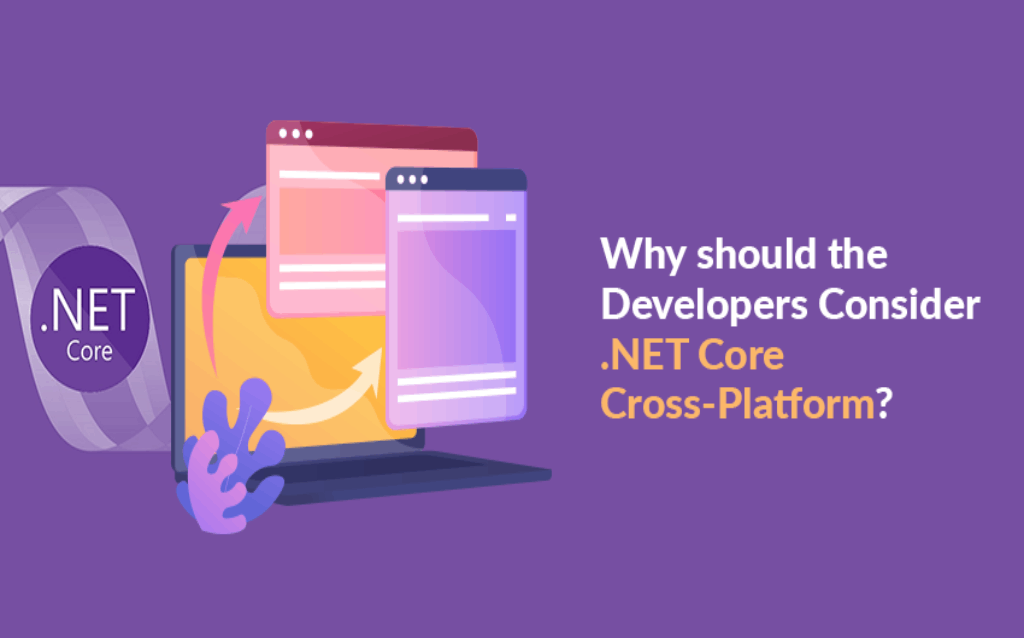Why should the Developers Consider .NET Core Cross-Platform?
When it comes to developing application, it is key that a developer picks the best tool available. We all know that well begun is half done and a framework lays the foundation for the application that needs to be created. Without a sturdy foundation, any building, even if it is built with the best raw materials, will eventually collapse. Just like a doctor picking a scalpel or a mechanic picking a wrench, a developer must choose the best framework. How does the developer do that tough job? What qualities does the best framework have? What should a developer be looking for while choosing a framework? Does the client also matter? What should a development company or service consider while conducting framework research? And why is .NET Core that perfect tool? Why is .NET core the most sought after framework to develop software applications? Read more to find about all the technicalities that surround these questions and their promising answers. With today’s fast-moving world, time is of essence. Dot NET Core development companies provide services to ensure that. Let’s look at a couple of the advantages .NET core holds over other development services. Flexible deployment: Dot NET core can be set up across multiple users as well as multiple machines. The benefits provided by microservices and containers can be availed of by hosting ASP.NET core apps. Open source: Dot NET core uses Apache 2 and MIT licences in order to be an open source platform. The .NET foundation, which owns it, is non-profit and supports the .NET ecosystem. Cross platform: Just like water seeks its own level, each developer prefers a particular platform. One of the best parts of using Dot NET core development is that it operates on macOS, Windows and Linux equally. It is also perfect for developing mobile applications, whether they are going to be used on Android, iOS or Windows. This makes both the developer and the consumer happy. Microservices architecture: Blending of services and microservices developed with .NET framework, JAVA and Ruby can be done with no hassle. This is because the architecture of .NET is allowed to be worked across a service boundary. Modular: Dot NET core supports the use of NuGet packages. This makes a programmer’s life easy since there is no assembling. Command-line tools: The tools provided by the .NET framework simple to use for local development as well as for continuous integration. Productivity: Top-notch apps can be created quickly. ASP Dot NET Core development companies are more productive and efficient because they use contemporary language constructs like LINQ (Language INtegrated Query), asynchronous programming, generics and much more. Because it incorporates a combination of common APIs, extensive class libraries, powerful tools and multi-language support by the Visual Studio family, .NET Core is highly effective. Performance: .NET Core is found to be faster than Go and NodeJS. Its lesser compute power is needed by the applications, resulting in a better response time. Microsoft recommends .NET Core to run with ASP.NET Core for the most effective scale and performance. This is helpful when using microservices, because it requires lesser machines and servers. A better UX provides more efficient applications, is cost effective and has better performance enhancement. Security: A collection of services prevents significant issues such as manipulating bad pointers or modifying compiled code. Microsoft ensures that any threat is taken care of immediately. Support: As .NET Core is efficient across platforms, support for it is provided for Windows, macOS and Linux equally as well. This development tool is updated several times every year for quality as well as security enhancement. Dot NET Core binary distributions are created and tested on servers in Azure which are maintained and supported by Microsoft. ASP.NET Core provides the following benefits: A unified story for building web UI and web APIs. Designed for testability. Razor Pages make coding page-focused scenarios easier and more productive. Blazor lets a developer use C# in the browser alongside JavaScript. Shared server-side and client-side app logic can all be written with .NET. Ability to develop and run on Windows, macOS and Linux. Open-source and community-focused. Integration of modern, client-side frameworks and development workflows. Support for hosting Remote Procedure Call (RPC) services using gRPC. A cloud-ready, environment-based configuration system. Built-in dependency injection. A lightweight, high-performance and modular HTTP request pipeline. Side-by-side versioning: This supports simultaneous running of multiple versions of applications. Tooling that simplifies modern web development. Ability to host the following: Kestrel, IIS, HTTP.sys, Nginx, Apache, Docker with no hassles. A developer can build modern, cloud-optimized, IoT and Mobile backend applications using ASP.NET Core framework. Can deploy the application either on the cloud or run on-premises. ASP.NET Core runs on .NET Core framework or .NET Standard framework. ASP.NET Core framework is a combination of MVC and Web API in a single web framework. Fast: It is a lightweight, high-performance web framework. Integration of Modern UI Framework – ASP.NET Core supports modern client-side frameworks like AngularJs, ReactJs and React with Redux etc. It supports modular HTTP requests. A developer needs only the following prerequisites: Basic knowledge of C#, Visual Studio, Object Oriented Programming concepts It is a cross-architecture framework. It is a mature framework which incorporates widely used programming languages. It enables flexibility. It has a large community. All in all, .NET Core is, without a doubt, a developer’s best friend. Not only does it encourage amateurs by being open-source, but it helps clients as well, because of its cross-platform capability. Creation of the code and usability of the developed app can be both carried out with ease. Developers should definitely consider .NET Core if they haven’t already. With features which enhance themselves in each updated version, it is a framework that is a must in any ASP .NET Core development company for sure!
Why should the Developers Consider .NET Core Cross-Platform? Read More »


